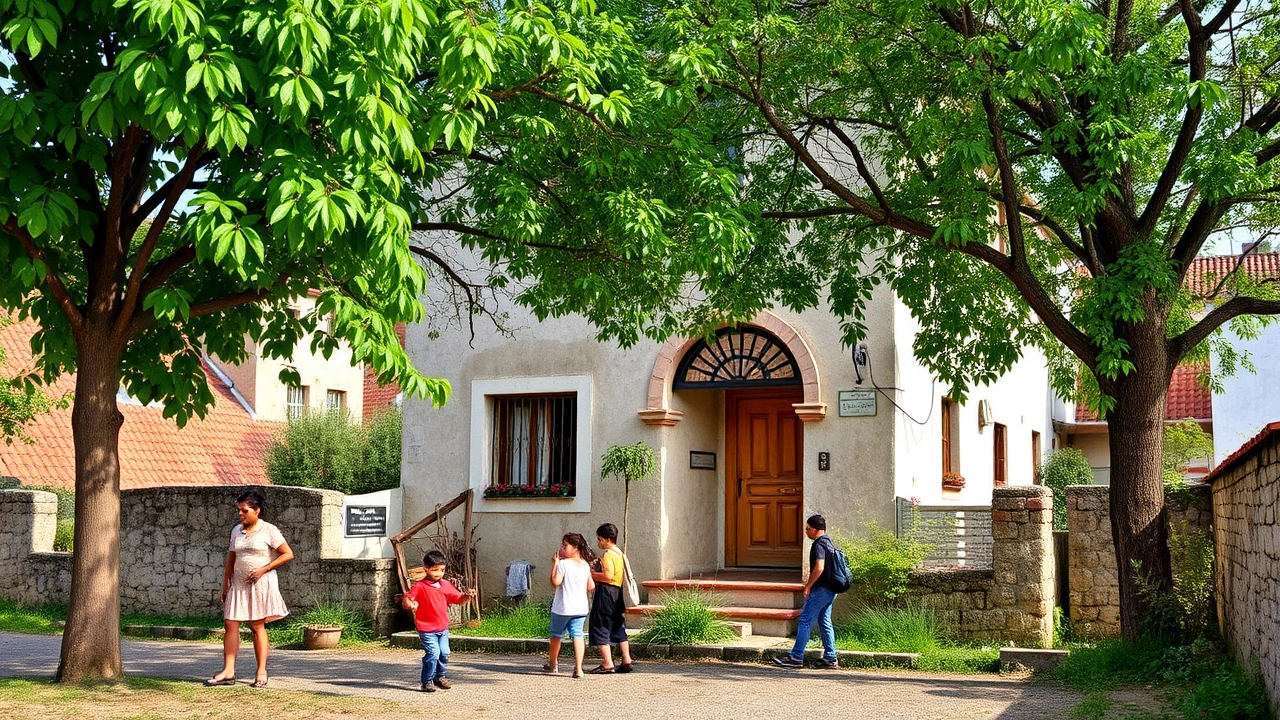
 Published on and written by Cyril Jarnias
Published on and written by Cyril Jarnias
Bali, the Island of the Gods, attracts millions of visitors each year, drawn by its paradise beaches, rich culture, and relaxing atmosphere. Beyond tourism, more and more expatriates and foreign investors are choosing to settle there permanently or acquire real estate. Long-term rental presents an attractive opportunity to generate regular income while benefiting from Bali’s growing property market. However, embarking on this venture requires a solid understanding of local specifics and careful preparation. In this article, we’ll guide you through the key steps to succeed in your long-term rental project in Bali.
The Balinese Rental Market: An Opportunity to Seize
The long-term rental market in Bali has experienced steady growth for several years. The constant influx of expatriates, digital nomads, and foreign retirees fuels strong demand for quality housing. Popular areas like Canggu, Seminyak, or Ubud offer attractive rental yields, potentially reaching 8 to 10% annually.
The diversity of the property portfolio allows targeting different customer segments: from modern studios for young professionals to luxurious villas with pools for families or groups of friends. Long-term leases, typically one year or more, provide owners with appreciable income stability.
However, it’s important to remain vigilant about certain challenges. Tourism seasonality can impact rental demand, especially during the low season. Additionally, regulations concerning foreign ownership remain complex and evolving. Therefore, it’s crucial to research thoroughly and work with local professionals to secure your investment.
Good to Know:
The Balinese rental market offers attractive yields but requires a good understanding of local specifics to succeed in your investment.
Choosing the Right Property: The Key to Success
Selecting the property to rent out is a crucial step that will largely determine the success of your project. Several criteria should be considered:
- Location: prioritize areas sought after by expatriates and long-term tourists. Canggu, Seminyak, Ubud, or Sanur are particularly popular.
- Property type: villas, apartments, or traditional houses—choose based on your budget and target clientele.
- Amenities: a pool, high-speed internet, or a workspace can make a difference.
- Overall condition: opt for a property in good condition or budget for renovations to meet expected standards.
The average purchase price for a 2-bedroom villa in Canggu is around 3 billion Indonesian rupiah (approximately 180,000 euros). This type of property can rent for between 15 and 20 million rupiah per month (900 to 1200 euros) in long-term rental.
Before committing, have a thorough market study conducted and visit several properties. Don’t hesitate to seek advice from experienced local real estate agents who can guide your choice and inform you about market trends.
Good to Know:
A well-located, properly equipped property in good condition will have a better chance of attracting long-term tenants and generating stable income.
Indonesian regulations concerning foreign ownership and property rental may seem complex at first. It’s essential to understand the legal framework to secure your investment and avoid future disputes.
Different Types of Property Ownership
In Indonesia, foreigners cannot directly hold full ownership of real estate. However, several options are available to you:
- Right to Use (Hak Pakai): allows a foreigner to use and occupy a property for a specified period, typically 25 years renewable.
- Long-Term Lease (Leasehold): offers the possibility to lease a property for a long duration, often 25 to 30 years, with renewal options.
- Establishing an Indonesian company (PT PMA): allows acquiring real estate through a local structure.
For long-term rental, the long-term lease (Leasehold) is often preferred by foreign investors. It offers interesting flexibility while limiting legal risks.
Establishing a Solid Lease Agreement
Once the property is acquired, establishing a clear and detailed lease agreement is paramount. This document should cover all aspects of the rental relationship, including:
- Lease duration (generally 1 to 3 years for long-term rentals)
- Rent amount and payment terms
- Utilities and responsibilities of each party
- Conditions for lease renewal or termination
- Rules for property use and any restrictions
It’s highly recommended to hire a local lawyer specialized in real estate law to draft and validate your lease agreement. This will ensure all legal aspects are covered and your interests are protected.
Good to Know:
Understanding the Indonesian legal framework and establishing a solid lease agreement are essential to securing your rental investment in Bali.
Setting the Right Price: The Art of Profitability
Determining the right rent is a delicate exercise that requires considering several factors. A price too high may deter potential tenants, while rent too low will impact your profitability.
Analyzing the Local Market
Start by studying prices in your area for similar properties. In Canggu, for example, the average monthly rent for a 2-bedroom villa in long-term rental ranges between 15 and 25 million rupiah (900 to 1500 euros). These figures can vary significantly depending on the exact location, amenities offered, and property quality.
Don’t hesitate to check online listings, contact local real estate agencies, or exchange with other property owners to refine your understanding of the market.
Calculating Your Costs
To ensure your investment’s profitability, it’s crucial to accurately assess all your costs:
- Property and residence taxes
- Maintenance and repair fees
- Potential homeowners association fees
- Management fees if you use an agency
- Property insurance
Once these costs are identified, you can determine the minimum rent needed to cover your expenses and generate a margin.
Adjusting Based on Demand
Rental demand in Bali can vary by season. The high season (July-August and December-January) generally sees an increase in demand and prices. You might consider adjusting your rates accordingly, while prioritizing stability for long-term rentals.
Remember that flexibility can be an asset to attract and retain good tenants. Offering options like a discount for a longer commitment can set you apart from the competition.
Good to Know:
A well-calibrated rent, based on thorough market analysis and your costs, is essential to optimize your property’s profitability while remaining attractive to tenants.
Effectively Managing Your Property: The Key to Sustainability
Effective management of your long-term rental property in Bali is essential to maintain its value, ensure stable income, and avoid problems. Here are some key aspects to consider:
Maintenance and Repairs
Bali’s tropical climate can be harsh on buildings. Regular maintenance is crucial to preserve your property’s quality. Plan for:
- Regular inspections (at least twice a year)
- An annual budget for repairs and maintenance (approximately 1 to 2% of the property’s value)
- A network of reliable professionals for quick interventions
Anticipating problems will help you avoid costly repairs and maintain tenant satisfaction.
Relationships with Tenants
Cultivating good relationships with your tenants is essential for a peaceful and durable rental. Some best practices:
- Respond quickly to requests and questions
- Be clear about rules and expectations from the start of the rental
- Respect tenants’ privacy while remaining available
- Be open to dialogue in case of problems
A survey conducted among expatriates in Bali revealed that 78% consider the owner’s responsiveness a key factor in their rental satisfaction.
Remote or On-Site Management?
If you don’t reside in Bali, remote management of your property can be complex. Two options are available to you:
1. Hire a rental management agency: These professionals can handle all aspects of the rental, from finding tenants to daily management. Management fees typically represent 10 to 15% of rental income.
2. Self-manage with the help of a local assistant: This option can be more economical but requires more involvement from you. You can hire a part-time assistant for on-site tasks.
Whichever option you choose, ensure you have clear processes for rent collection, security deposit management, and contract tracking.
Good to Know:
Proactive and professional management of your long-term rental property in Bali is essential to maximize your profitability and ensure tenant satisfaction over the long term.
Tax and Financial Aspects: Optimizing Your Investment
Understanding and optimizing the tax and financial aspects of your long-term rental in Bali is crucial to maximizing your investment’s profitability.
Indonesian Taxation
In Indonesia, rental income is subject to tax. The tax rate on rental income for non-residents is generally 20%. However, there are nuances depending on the type of property and the owner’s status.
Key points to remember:
- Annual declaration of rental income to Indonesian tax authorities
- Possibility to deduct certain expenses (maintenance, repairs, etc.) from taxable income
- Importance of keeping all receipts for expenses and income
It’s highly recommended to consult a local accountant to optimize your tax situation and ensure compliance with all legal obligations.
Managing Financial Flows
Managing financial flows related to your rental can be complex, especially if you reside abroad. Some tips:
- Open a local bank account to facilitate transactions
- Use international money transfer platforms to optimize exchange rates
- Set up a detailed tracking system for income and expenses
According to a recent study, property owners who use dedicated rental property financial management tools improve their profitability by 7 to 12% on average.
Long-Term Planning
To optimize your investment over the long term, consider the following points:
- Plan for renovation and improvement of the property every 5 to 7 years to maintain its appeal
- Consider an exit strategy (resale, transfer) from the start of your investment
- Monitor the evolution of the Balinese real estate market to adjust your strategy if necessary
Rigorous financial planning will allow you to maximize your investment’s benefits while minimizing risks.
Good to Know:
Optimized tax and financial management of your long-term rental property in Bali can significantly improve your investment’s profitability. Don’t hesitate to seek professional guidance.
Conclusion: A Promising Investment with the Right Tools
Renting out property long-term in Bali represents an attractive opportunity for savvy investors. The dynamic market, sustained demand, and potential high yields make it a promising investment. However, succeeding in this venture requires careful preparation, a good understanding of the local context, and rigorous management.
By following the detailed advice in this article—from property selection to daily management, including legal and tax aspects—you’ll give yourself every chance to succeed in your long-term rental project in Bali. Remember that every investment carries risks, and it’s crucial to inform yourself well and surround yourself with competent professionals.
Bali offers an exceptional living environment and unique opportunities for real estate investors. With the right approach and professional management, your long-term rental property can become a stable and rewarding source of income, while allowing you to enjoy the charms of the Island of the Gods.
Disclaimer: The information provided on this website is for informational purposes only and does not constitute financial, legal, or professional advice. We encourage you to consult qualified experts before making any investment, real estate, or expatriation decisions. Although we strive to maintain up-to-date and accurate information, we do not guarantee the completeness, accuracy, or timeliness of the proposed content. As investment and expatriation involve risks, we disclaim any liability for potential losses or damages arising from the use of this site. Your use of this site confirms your acceptance of these terms and your understanding of the associated risks.















































